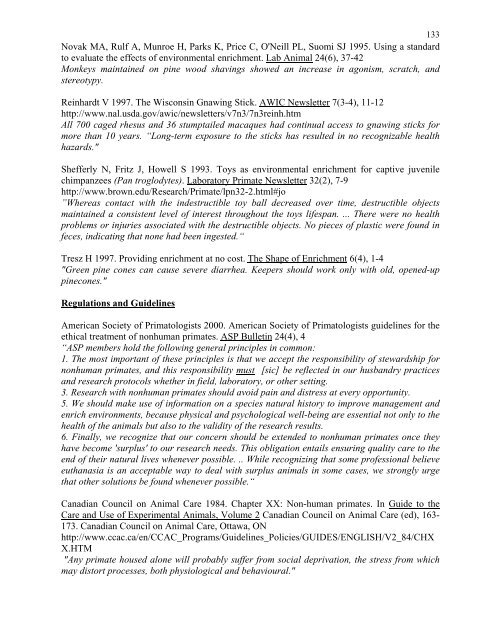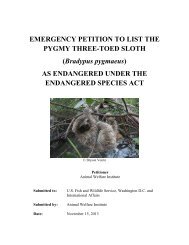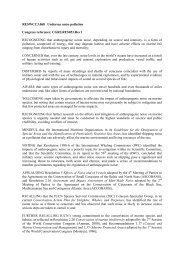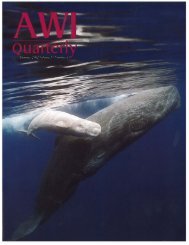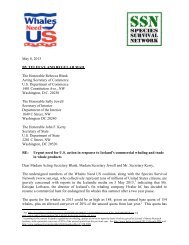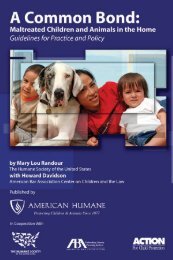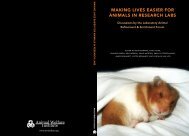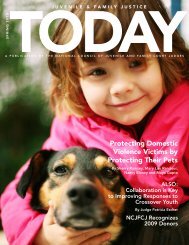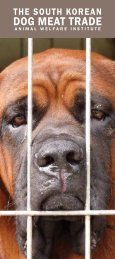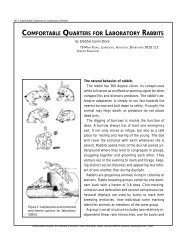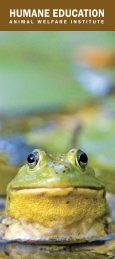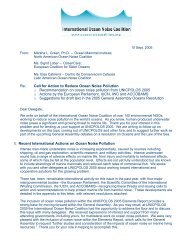133Novak MA, Rulf A, Munroe H, Parks K, Price C, O'Neill PL, Suomi SJ 1995. Using a sta<strong>nd</strong>ardto evaluate the effects of environ<strong>ment</strong>al enrich<strong>ment</strong>. Lab Animal 24(6), 37-42Monkeys maintained on pine wood shavings showed an increase in agonism, scratch, a<strong>nd</strong>stereotypy.<strong>Re</strong>inhardt V 1997. The Wisconsin Gnawing Stick. AWIC Newsletter 7(3-4), 11-12http://www.nal.usda.gov/awic/newsletters/v7n3/7n3reinh.htmAll 700 caged rhesus a<strong>nd</strong> 36 stumptailed macaques had continual access to gnawing sticks <strong>for</strong>more than 10 years. “Long-term exposure to the sticks has resulted in no recognizable healthhazards."Shefferly N, Fritz J, Howell S 1993. Toys as environ<strong>ment</strong>al enrich<strong>ment</strong> <strong>for</strong> captive juvenilechimpanzees (Pan troglodytes). Laboratory <strong>Prima</strong>te Newsletter 32(2), 7-9http://www.brown.edu/<strong>Re</strong>search/<strong>Prima</strong>te/lpn32-2.html#jo”Whereas contact with the i<strong>nd</strong>estructible toy ball decreased over time, destructible objectsmaintained a consistent level of interest throughout the toys lifespan. ... There were no healthproblems or injuries associated with the destructible objects. No pieces of plastic were fou<strong>nd</strong> infeces, i<strong>nd</strong>icating that none had been ingested.“Tresz H 1997. Providing enrich<strong>ment</strong> at no cost. The Shape of <strong>En</strong>rich<strong>ment</strong> 6(4), 1-4"Green pine cones can cause severe diarrhea. Keepers should work only with old, opened-uppinecones."<strong>Re</strong>gulations a<strong>nd</strong> GuidelinesAmerican Society of <strong>Prima</strong>tologists 2000. American Society of <strong>Prima</strong>tologists guidelines <strong>for</strong> theethical treat<strong>ment</strong> of nonhuman prim<strong>ates</strong>. ASP Bulletin 24(4), 4“ASP members hold the following general principles in common:1. The most important of these principles is that we accept the responsibility of stewardship <strong>for</strong>nonhuman prim<strong>ates</strong>, a<strong>nd</strong> this responsibility must [sic] be reflected in our husba<strong>nd</strong>ry practicesa<strong>nd</strong> research protocols whether in field, laboratory, or other setting.3. <strong>Re</strong>search with nonhuman prim<strong>ates</strong> should avoid pain a<strong>nd</strong> distress at every opportunity.5. We should make use of in<strong>for</strong>mation on a species natural history to improve manage<strong>ment</strong> a<strong>nd</strong>enrich environ<strong>ment</strong>s, because physical a<strong>nd</strong> psychological well-being are essential not only to thehealth of the animals but also to the validity of the research results.6. Finally, we recognize that our concern should be exte<strong>nd</strong>ed to nonhuman prim<strong>ates</strong> once theyhave become 'surplus' to our research needs. This obligation entails ensuring quality care to thee<strong>nd</strong> of their natural lives whenever possible. .. While recognizing that some professional believeeuthanasia is an acceptable way to deal with surplus animals in some cases, we strongly urgethat other solutions be fou<strong>nd</strong> whenever possible.“Canadian Council on Animal Care 1984. Chapter XX: Non-human prim<strong>ates</strong>. In Guide to theCare a<strong>nd</strong> Use of Experi<strong>ment</strong>al Animals, Volume 2 Canadian Council on Animal Care (ed), 163-173. Canadian Council on Animal Care, Ottawa, ONhttp://www.ccac.ca/en/CCAC_Programs/Guidelines_Policies/GUIDES/ENGLISH/V2_84/CHXX.HTM"Any primate housed alone will probably suffer from social deprivation, the stress from whichmay distort processes, both physiological a<strong>nd</strong> behavioural."
134Canadian Council on Animal Care 1993. Guide to the Care a<strong>nd</strong> Use of Experi<strong>ment</strong>al Animals,Volume 1, 2<strong>nd</strong> Edition. Canadian Council on Animal Care, Ottawa, ONhttp://www.ccac.ca/en/CCAC_Programs/Guidelines_Policies/GUIDES/ENGLISH/V1_93/CHAP/CHVI.HTM"All animals must be observed at least once daily. .. The social needs of animals used inresearch, teaching, or testing, should be given equal consideration with environ<strong>ment</strong>al factorssuch as lighting, heating, ventilations a<strong>nd</strong> contain<strong>ment</strong> (caging). Particularly in the case ofsingly housed animals, daily observation provides an alternative from of social contact <strong>for</strong> theanimal a<strong>nd</strong> commonly facilit<strong>ates</strong> ha<strong>nd</strong>ling in that the animal becomes accustomed to the humanpresence. .. Most animals should not be housed singly unless required by medical co<strong>nd</strong>ition,aggression, or dict<strong>ates</strong> of the study. Singly housed animals should have some degree of socialcontact with others of their own ki<strong>nd</strong>. .. In the interest of well-being, a social environ<strong>ment</strong> isdesired <strong>for</strong> each animal which will allow basic social contacts a<strong>nd</strong> positive social relationships.Social behaviour assists animals to cope with circumstances of confin<strong>ment</strong>. .. <strong>Re</strong>straintprocedures should only be invoked after all other less stressful procedures have been rejected asalternatives. ... Physiological, biochemical a<strong>nd</strong> hormonal changes occur in any restraint animal... a<strong>nd</strong> investigators should consider how these effects will influence their proposedexperi<strong>ment</strong>s."Council of Europe 2006 Appe<strong>nd</strong>ix A of the European Convention <strong>for</strong> the Protection ofVertebrate Animals Used <strong>for</strong> Experi<strong>ment</strong>al a<strong>nd</strong> Other Scientific Purposes (ETS No. 123) enactedJune 15, 2007. Strasbourg, France: Council of Europehttp://conventions.coe.int/Treaty/EN/Treaties/PDF/123-Arev.pdfProgressive regulations pertaining to the species-appropriate housing a<strong>nd</strong> ha<strong>nd</strong>ling of animalskept in research labs."Because the common laboratory non-human prim<strong>ates</strong> are social animals, they should behoused with one or more compatible conspecifics. .. Single housing should only occur if there isjustification on veterinary or welfare grou<strong>nd</strong>. Single housing on experi<strong>ment</strong>al grou<strong>nd</strong>s should bedetermined in consultation with the animal technician a<strong>nd</strong> with the competent person chargedwith advisory duties in relation to the well-being of the animals.<strong>Prima</strong>tes dislike being ha<strong>nd</strong>led a<strong>nd</strong> are stressed by it; training animals to co-oper<strong>ates</strong>hould be encouraged, as this will reduce the stress otherwise caused by ha<strong>nd</strong>ling. Training theanimals is a most important aspect of husba<strong>nd</strong>ry, particularly in long-term studies. .. Trainingcan often be employed to encourage the animals to accept minor interventions, such as bloodsampling.The flight reaction of non-human prim<strong>ates</strong> from terrestrial predators is vertical, ratherthan horizontal; even the least arboreal species seek refuge in trees or on cliff faces. As a result,enclosure height should be adequate to allow the animal to perch at a sufficiently high level <strong>for</strong>it to feel secure. .. The minimum enclosure height <strong>for</strong> caged marmosets a<strong>nd</strong> tamarins is 1.5 m;the minimum enclosure height <strong>for</strong> caged squirrel monkeys, macaques, vervets a<strong>nd</strong> baboons is 1.8m. .. The structural division of space in primate enclosures is of paramount importance. It isessential that the animals should be able to utilise as much of the volume as possible because,being arboreal, they occupy a three-dimensional space. The make this possible, perches a<strong>nd</strong>climbing structures should be provided.“Home Office 1989. Animals (Scientific Procedures) Act 1986. Code of Practice <strong>for</strong> the Housinga<strong>nd</strong> Care of Animals Used in Scientific Procedures. Her Majesty's Stationery Office, Lo<strong>nd</strong>on, UKhttp://sciencea<strong>nd</strong>research.homeoffice.gov.uk/animal-research/legislation/"Experi<strong>ment</strong>al results may be influenced by environ<strong>ment</strong>al co<strong>nd</strong>itions. .... Unstableenviron<strong>ment</strong>al co<strong>nd</strong>itions are likely to introduce avoidable variability into biological responses.
- Page 3:
Table of ContentsSpecies-typical Be
- Page 7 and 8:
2Behavioral Pathologies (Abnormal B
- Page 9 and 10:
Meyerson BJ 1986. Ethology in anima
- Page 11 and 12:
6"An animal treated unsympathetical
- Page 13 and 14:
8"If sufficient room is not provide
- Page 15 and 16:
Canadian Council on Animal Care 198
- Page 17 and 18:
12Platt DM, Kinsey JH, Jorgenson MJ
- Page 19 and 20:
14(7) Enforced RestraintAdams MR, K
- Page 21 and 22:
16Goosen DJ, Davies JH, Maree M, Do
- Page 23 and 24:
Norman RL, McGlone J, Smith CJ 1994
- Page 25 and 26:
20Crockett CM, Bowers CL, Shimoji M
- Page 27 and 28:
22(10) Double-tier Cage Arrangement
- Page 29 and 30:
National Research Council 1998. The
- Page 31 and 32:
26Coe CL 1991. Is social housing of
- Page 33 and 34:
28Tatoyan SK, Cherkovich GM 1972. T
- Page 35 and 36:
30Line SW, Morgan KN, Markowitz H,
- Page 37 and 38:
32Reinhardt V 1989. Evaluation of t
- Page 39 and 40:
34Clarke AS, Juno CJ, Maple TL 1982
- Page 41 and 42:
36The animals “spent most time in
- Page 43 and 44:
38Brent L, Belik M 1997. The respon
- Page 45 and 46:
40"Access to the puzzles was accomp
- Page 47 and 48:
42"The purpose of this study was to
- Page 49 and 50:
44Choi GC 1993. Humans enrich the l
- Page 51 and 52:
46“Eleven baboons who had been si
- Page 53 and 54:
48Reinhardt V, Houser WD, Eisele S,
- Page 55 and 56:
50Thompson MA, Bloomsmith MA, Taylo
- Page 57 and 58:
(7) Working with Cooperative Animal
- Page 59 and 60:
54Lambeth SP, Hau J, Perlman JE, Ma
- Page 61 and 62:
56Smith M, Barley J, Down N, Franci
- Page 63 and 64:
Environmental Enrichment58(1) Defin
- Page 65 and 66:
60Baker KC, Seres M, Aureli F, de W
- Page 67 and 68:
62Judge PG, de Waal BM, Paul KS, Go
- Page 69 and 70:
(2,1,b) Group-housing: Group Format
- Page 71 and 72:
66McNary JK 1992. Integration of ch
- Page 73 and 74:
68Clarke MR, Blanchard JL 1994. All
- Page 75 and 76:
Watts E 1997. Introductions. In Ora
- Page 77 and 78:
72Baumans V, Coke C, Green J, Morea
- Page 79 and 80:
74Hotchkiss CE, Paule MG 2003. Effe
- Page 81 and 82:
76Reinhardt V, Hurwitz S 1993. Eval
- Page 83 and 84:
78Shively CA 2001. Psychological we
- Page 85 and 86:
80“The establishment of dominance
- Page 87 and 88: 82Reinhardt V 1991. Agonistic behav
- Page 89 and 90: Abney D, Conlee K, Cunneen M, Down
- Page 91 and 92: 86Boccia ML, Broussard C, Scanlan J
- Page 93 and 94: Southey ER, Baldwin CM 2006. Social
- Page 95 and 96: T-W-Fiennes RN 1972. Primates - Gen
- Page 97 and 98: 927 to 44 training sessions. .. The
- Page 99 and 100: 94Baumans V, Coke C, Green J, Morea
- Page 101 and 102: 96Skoumbourdis EK 2008. Pole-and-co
- Page 103 and 104: 98Tamarins (Saguinus spp.)Smith TE,
- Page 105 and 106: 100Bertrand F, Seguin Y, Chauvier F
- Page 107 and 108: 102Gilloux I, Gurnell J, Shepherdso
- Page 109 and 110: 104Molzen EM, French JA 1989. The p
- Page 111 and 112: 106Reinhardt V 1992. Foraging for c
- Page 113 and 114: 108Boccia ML 1989. Long-term effect
- Page 115 and 116: 110Baumans V, Coke C, Green J, More
- Page 117 and 118: 112”We give our pair-housed cynos
- Page 119 and 120: 114use their hands to obtain and pr
- Page 121 and 122: 116MacLean E, Roberts Prior S 2006.
- Page 123 and 124: Bayne K, Hurst JK, Dexter SL 1992.
- Page 125 and 126: 120Phillippi-Falkenstein K 1998. Us
- Page 127 and 128: 122Shimoji M, Bowers CL, Crockett C
- Page 129 and 130: Anonymous 1991. The psychological w
- Page 131 and 132: 126Pruetz JD, Bloomsmith MA 1992. C
- Page 133 and 134: 128Reinhardt V 1990. Time budget of
- Page 135 and 136: 130O'Neill PL, Wright AC, Weed JL 1
- Page 137: 132above ground level. I very often
- Page 141 and 142: 136International Primatological Soc
- Page 143 and 144: 138forage daily, by scattering food
- Page 145 and 146: 140sensory and emotional experience
- Page 147 and 148: 142Bayne K 1989 Resolving issues of
- Page 149 and 150: 144creation? Very unlikely!I think
- Page 151: 146Spaeth GL 1994. Editorial: Carin


